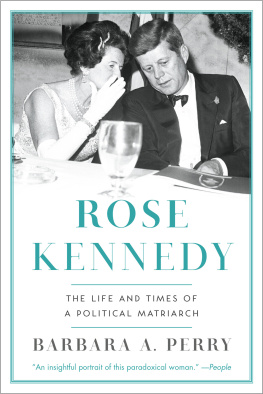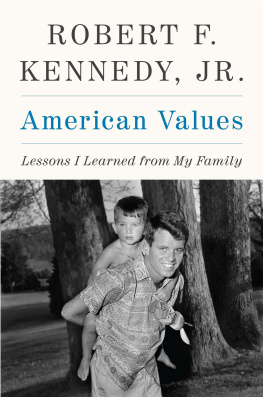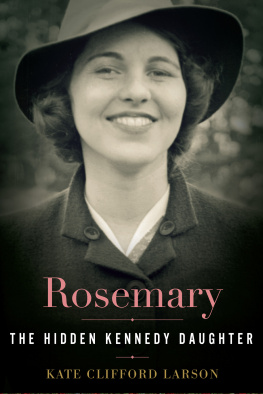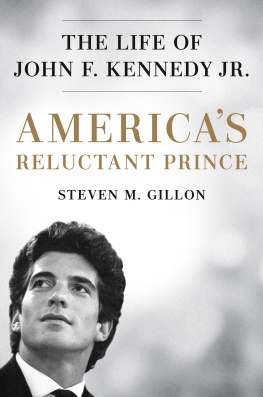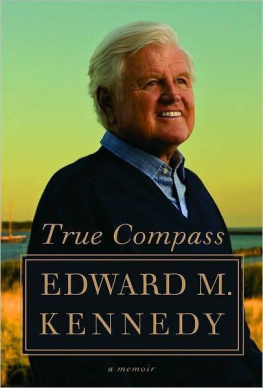
ROSE
KENNEDY
THE LIFE AND TIMES OF A
POLITICAL MATRIARCH
Barbara A. Perry

W. W. NORTON & COMPANY
New York London
For Rose and Rob Capon

I WILL NEVER ALLOW MYSELF TO BE VANQUISHED OR ANNIHILATED. I have always enjoyed living and working, and I believe I have had a great life, Rose Fitzgerald Kennedy declared as she neared eighty. Citing British theologian John Cardinal Newman, she believed that God had created her to perform some definite service. I may never know it in this life, but I shall be told it in the next.1 If such an afterlife exists, Rose Kennedy arrived there on January 22, 1995, at age 104. At the pearly gates she would have reviewed her lifes stunning intersection with the twentieth centurys most historic events and told Saint Peter her version of life as a Boston belle, devoted wife, award-winning mother, devout Irish Catholic, indefatigable campaigner, charitable fund-raiser, and stoic heroine. She would have asked for the most stylish heavenly gown for the reunion with her husband and four children, who had preceded her in death. If they had not yet achieved beatific perfection, Rose would surely have offered advice about how to do so. On Earth she had been absent for more than a decade from the public stage she occupied most of her life. Usually a supporting actor, Rose relished portraying the leading lady. Yet she also embraced less glamorous theatrical duties: stage manager, playwright, dresser, makeup artist, and casting director for her familys successful political productions. Often upstaged by her father, husband, and sons, she outlived all but one and fashioned a family mythology that endures.
Debilitated by strokes in her final years, Rose couldnt plan her funeral, but she surely would have approved the tasteful familial service, filled with ritualistic Catholic liturgy. Three Kennedy generations had gathered for a traditional Irish wake at their storied Cape Cod compound. Then they accompanied Roses remains to Bostons historic North End, site of her 1890 birth. A few blocks from her birthplace stands St. Stephens, its edifice purchased from Congregationalists by Bostons Catholic diocese in 1862 to serve the waves of Irish Catholic immigrants flooding into surrounding tenements. Restored in 1964, under Kennedy prelate Richard Cardinal Cushings direction, the churchs red-brick facade, decorated with white pilasters and crowned by a clock tower and belfry, epitomizes classic Federal-era architecture.
On a chilly, gray January morning, the black hearse carrying Rose Kennedys elegant mahogany casket approached the churchs front entrance. Baby Rose had crossed the same threshold for her 1890 christening, as had her legendary father, John F. (Honey Fitz) Fitzgerald, in 1863. Across the narrow street, with its old-world ambience, stood respectful spectators, bundled against the biting New England cold, hoping to glimpse the celebrated Kennedys.
Roses final act didnt disappoint them or C-SPAN viewers watching the two-hour Mass of Resurrection. As funeral directors slipped a white shroud over her coffin, the matriarchs children and their progeny gathered around. The oldest grandchildren served as pallbearers, accompanying Grandma Kennedys casket up the churchs center aisle. Their names recalled her agony and ecstasy, as Rose had labeled lifes dramas. Kathleen, assassinated Senator Robert F. Kennedys eldest, bears the name of Roses beloved daughter, nicknamed Kick, whose love life broke her mothers heart. Kick perished in a 1948 plane crash on her way to the south of France with her married boyfriend. (Kicks first husband, a Protestant British nobleman, died from a Nazi snipers bullet in 1944. Only a few weeks before, Roses cherished oldest child, Joseph P. [Joe] Kennedy Jr., a Navy pilot, died when his plane exploded over the English countryside.) Caroline, daughter of murdered President John F. Kennedy, was still overcoming the 1994 cancer death of her mother, First Lady Jacqueline Kennedy Onassis. Christopher, the tall, handsome son of Patricia Kennedy Lawford and her former husband, the late Hollywood actor Peter Lawford, struggled with another of the familys cursessubstance abuse, which had also hastened his fathers death.
Robert S. (Bobby) Shriver III hailed from the most stable family in the Kennedy clan, led by his mother, Eunice, named for Roses sister (a tuberculosis victim at age twenty-three) and founder of the Special Olympics, and her husband, R. Sargent (Sarge) Shriver Jr., first director of JFKs Peace Corps and former ambassador to France. Yet they had been embarrassed over Bobbys 1970 drug bust for pot possession. Police had arrested him, along with his cousin, Robert Kennedy Jr. Kara, Senator Edward M. (Teddy) Kennedys eldest, represented him and his former wife, Joan, who both suffered from public bouts of alcoholism, as would their youngest son, Congressman Patrick Kennedy (D-RI). Karas brother, Teddy Jr., limped into Roses funeral on a prosthetic leg, resulting from his battle with cancer as a twelve-year-old.
Steve Smith Jr.s mother, Jean Kennedy Smith, bore the title of US ambassador to Ireland, following in the footsteps of her late father, Joseph P. (Joe) Kennedy Sr., ambassador to the Court of St. Jamess at the start of World War II. In 1969 Joe had succumbed to the aftereffects of a devastating stroke suffered eight years before. Steves father, Steve Smith Sr., had served as the business manager of the Kennedys campaigns and Kennedy Foundation. Steve Sr. had died of cancer in 1990 before his younger son, William Kennedy Smith, faced 1991 rape charges after Good Friday barhopping in Palm Beach with uncle Teddy and cousin Patrick. Having admitted in court that he had displayed poor judgment in carousing with his son and nephew on one of the Catholic Churchs most solemn nights, Teddy was relieved when the jury acquitted young Willie, then a medical student. Forever tied to Chappaquiddick, where his car careened off a rustic bridge in 1969 and drowned Mary Jo Kopechne, Teddy had begun to reform his dissolute private life. After a public confession of past mistakes, he married Victoria Reggie in 1992. By all accounts, their happy union set him on a straighter path and made him an even more effective legislator as well as family patriarch.
Before the 1990s gave way to the twenty-first century, two more of Roses grandchildren would join in death their cousin David Kennedy, Roberts son, who fell victim to a 1984 drug overdose at a seedy Palm Beach motel. Davids brother, Michael, ran head-on into a tree on an Aspen ski slope while playing ice football with his siblings on New Years Eve 1997. Two years later, John F. Kennedy Jr. crashed his private plane off Marthas Vineyard on a hazy July 1999 evening, killing himself, his wife, and her sister.
At St. Stephens the bright interior and happy remembrances of Roses full life lifted the gloom of the leaden skies and grieving family. Bostons Bernard Cardinal Law delivered Pope John Paul IIs condolences. Rose would have savored that honor. In 1964 she had told a journalist that among the most meaningful events in her life were a 1939 audience with Pope Pius XII and a 1936 meeting with the future pontiff and President Franklin Roosevelt at Hyde Park.2 Robert Kennedys widow, Ethel, mother of their eleven children, gave the first reading. As early as 1983, when her mother-in-laws health began to deteriorate, the family had chosen a passage from the book of Proverbs to summarize Roses life:
Strength and dignity are her clothing, and she laughs at the time to come. She opens her mouth with wisdom, and the teaching of kindness is on her tongue. She looks well to the ways of her household, and does not eat the bread of idleness. Her children rise up and call her happy; her husband too, and he praises her; Many women have done excellently but you surpass them all. Charm is deceitful, and beauty is vain, but a woman who fears the Lord is to be praised. Give her a share in the fruit of her hands, and let her works praise her in the city gates.3
Next page
